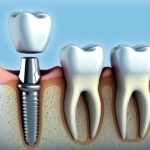Would you be pleased if informed by your dentist in Cambridge that you need a root canal? The chances are high that you have a few questions besides some concerns. For example, you might want to know how long a root canal takes to recover, even before your procedure. We think providing you with some information helps prepare you physically and mentally for your upcoming root canal therapy.
When you hear the words root canal, questions spring to your mind immediately because you expect to undergo an uncomfortable process. However, your dentist can help ease your mind with information that present-day root canals are not painful as they were earlier. Advances in dentistry and modern anesthesia make root canals no more painful than getting a dental filling.
The pain you experience from root canals is primarily before the procedure and not after. Dentists also use minimally invasive techniques with expertise when performing root canals after considering alternative treatments if available.
Why Do Root Canals Become Necessary?
Root canals are some of the most common dental procedures, with endodontists performing over 14 million procedures every year. Given the modern anesthetics and experienced endodontists, root canal treatment in Cambridge, ON, successfully preserves the natural tooth.
At times tooth decay gets to the inner layers of the tooth to infect the dental pulp and root. The root of the tooth is sensitive because it contains blood vessels, connective tissue, and nerves. You might develop deep decay in the tooth from trauma, cracks, and chips. The injuries causing deep decay require intervention like a root canal.
During the process, an endodontist will create a tiny access hole in the tooth’s crown to expose the dental pulp before cleaning the damaged or decayed pulp from within the tooth.
Depending on the severity of the infection, you might require multiple appointments to complete root canal treatment. After completing the procedure, the endodontist places a temporary filling in the access hole in the crown of your tooth. Finally, the endodontist recommends you see your regular dentist as soon as possible and get the tooth restored with a dental crown to provide it with the strength and functionality it needs to function like your other teeth.
Root canals help preserve your natural teeth from extraction because it is the only alternative available to this treatment. Sometimes tooth extractions become the only option. However, keeping your natural tooth is the most beneficial. When root canals are performed by experienced endodontists, the treatment allows many patients to retain their natural teeth while relieving them from the pain they experience.
Recovering from Root Canals
Before starting your process, your dentist gives you anesthesia to manage the discomfort. As the anesthesia begins wearing off, you experience some soreness from the cleaning process, and the pain remains with you for a few days. The dentist recommends that you avoid chewing with the treated tooth and chew on the opposite side of the mouth.
Your dentist recommends a prescription or over-the-counter pain relievers to manage the discomfort. While many people start regular activities immediately after undergoing the treatment, it is possible that you may require several days to complete root canal recovery time. You can expect discomfort from the procedure for approximately ten days, although some patients recover faster.
Keeping Your Teeth Healthy after a Root Canal
If you want to minimize the risk of needing another root canal, you can try the following tips for assistance.
Follow the suggested oral hygiene techniques, including brushing two times per day or two minutes each with a soft-bristled toothbrush. You can use gentle circular motions when brushing or inquire with your dentist or hygienist for a demonstration.
Flossing is also essential regardless of when you do it during the day.
You must avoid hard foods in the initial few days following your root canal. Later you must avoid harmful mouth-related habits like chewing ice, hard candies, et cetera.
Reduce your consumption of sugary and acidic foods and drinks besides following your dental professional’s recommended exam and cleaning schedule.
Root canals are no longer fearsome as they were earlier. During the recovery time after undergoing root canals, you find that the treatment provides relief from the pain you endure with the decayed tooth in your mouth. Following root canal treatment, you recover within a few days or a week to complete your recovery.
If you have a specific painful tooth in your mouth indicating the need for root canal treatment, Dental Art Clinics perform many such procedures to help patients preserve their natural teeth. Kindly schedule your appointment with best practice today to receive root canals if required.






